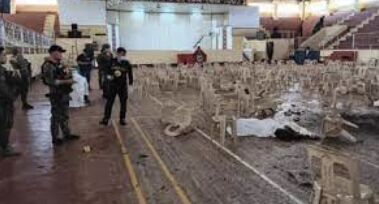Bomb blast at Mindanao State University kills four, raises security concerns in the Philippines
A bomb blast at Mindanao State University in Marawi city kills four people and injures dozens of Catholic worshippers. President Marcos Jr. blames foreign terrorists, while officials suspect Muslim militants seeking revenge. Security concerns rise nationwide.
A bomb blast at Mindanao State University in southern Marawi city has killed four people and wounded dozens of Catholic worshippers, according to Philippine President Ferdinand Marcos Jr. The suspected bomb, made from a mortar round, hit students and teachers attending Mass in the university gymnasium. Regional military commander Maj. Gen. Gabriel Viray III confirmed the death toll and said 50 others were taken to hospitals for treatment. The president immediately blamed foreign terrorists for the bombing, although he did not provide an explanation.
Defense Secretary Gilberto Teodoro Jr. later supported this claim, stating that there was a strong indication of a foreign element involved. Gen. Romeo Brawner Jr., the military chief of staff, suggested that the bomb attack may be a retaliatory move by Muslim militants following a number of battle setbacks. He referenced the recent killing of 11 suspected Islamic militants in a military offensive in southern Maguindanao province. Regional police director Brig. Gen. Allan Nobleza identified the slain militants as members of Dawlah Islamiyah, an armed group associated with the Islamic State (IS) that still has a presence in Lanao del Sur province.
Marawi city, known for its numerous mosques, was previously besieged by foreign and local Islamic militants in 2017, resulting in over 1,100 deaths. Army troops and police have cordoned off the university and begun an investigation into the attack. Security checkpoints have been set up throughout the city, and police and state forces have been put on heightened alert in metropolitan Manila. Law enforcement officials found fragments of a 60mm mortar round at the scene, leading them to believe that the explosives were fashioned from mortar rounds, a method typically used by Islamic militants in the country's south.
The deadly blast has raised security concerns across the country as the Christmas season commences. The Philippine coast guard has ordered all personnel to intensify intelligence gathering and inspections, and to deploy bomb-sniffing dogs and sea marshals to passenger ferries. Coast Guard Chief Admiral Ronnie Gavan has emphasized the importance of maintaining public service in the face of such barbaric acts. The southern Philippines, home to a minority Muslim population, has been the site of long-standing separatist rebellions. While the largest armed insurgent group, the Moro Islamic Liberation Front, signed a peace deal with the government in 2014, smaller armed groups continue to reject the pact and carry out bombings and other attacks, evading government offensives.




